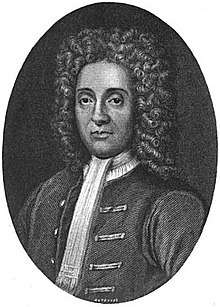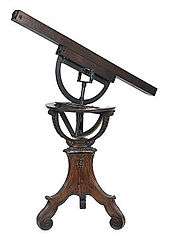Abraham Sharp
Abraham Sharp (1653 – 18 July 1742) was an English mathematician and astronomer.

Biography of Abraham Sharp
Sharp was born in Horton Hall in Little Horton, Bradford, the son of well-to-do merchant John Sharp and Mary (née Clarkson) Sharp and was educated at Bradford Grammar School.[1]

In 1669 he became a merchant's apprentice before becoming a schoolmaster in Liverpool and subsequently a bookkeeper in London. His wide knowledge of mathematics and astronomy attracted Flamsteed's attention and it was through Flamsteed that Sharp was invited, in 1688, to enter the Greenwich Royal Observatory. There he did notable work, improving instruments and showing great skill as a calculator, publishing Geometry Improved and logarithmic tables.
Sharp calculated pi to 72 decimal places using an arctan sequence, briefly holding the record until John Machin calculated 100 digits in 1706.[2]
He returned to Little Horton in 1694. When the Atlas Coelestis – the largest star map at the time was published[3] – it contained 26 maps of the major constellations visible from Greenwich, and two planispheres designed by Sharp.[4]
Sharp died in Little Horton in 1742. He was never married. He was a great-uncle of Jesse Ramsden, the scientific instrument maker.[5]
An English translation of a memorial tablet in Latin in Bradford Cathedral reads, " He was rightly counted among the most accomplished mathematicians of his day. He enjoyed constant friendship with the very famous men of the same repute, notably Flamsteed and the illustrious Newton. He drew up the description of the heavens made by the former of these (Flamsteed) in (astronomical) tables of the greatest accuracy; he also published anonymously various writings and descriptions of instruments perfected by himself... .
The crater Sharp on the Moon is named after him.
References
- "Abraham Sharp". Retrieved 14 March 2011.
- Beckmann, Petr (1971). A History of Pi. New York: St. Martin's Press. p. 102. ISBN 0-312-38185-9.
- Linda Hall Library (ed.). "Flamsteed, John. Atlas coelestis. London, 1729". Archived from the original on 27 September 2011. Retrieved 12 May 2011.
- Davide Neri. "John Flamsteed, Atlas coelestis". Retrieved 8 May 2011.
- Melmore, S. (1938). "Abraham Sharp's Universal Instrument". The Observatory. 61: 248–250. Bibcode:1938Obs....61..248M.
Further reading
- Cudworth, William (1889). Life and Correspondence of Abraham Sharp. London: Sampson Low, Marston, Searle and Livington, Ltd.
abraham sharp.
- Connor, Elizabeth (1942). "Abraham Sharp, 1653-1742". Publications of the Astronomical Society of the Pacific. 54: 237–243. Bibcode:1942PASP...54..237C. doi:10.1086/125455.